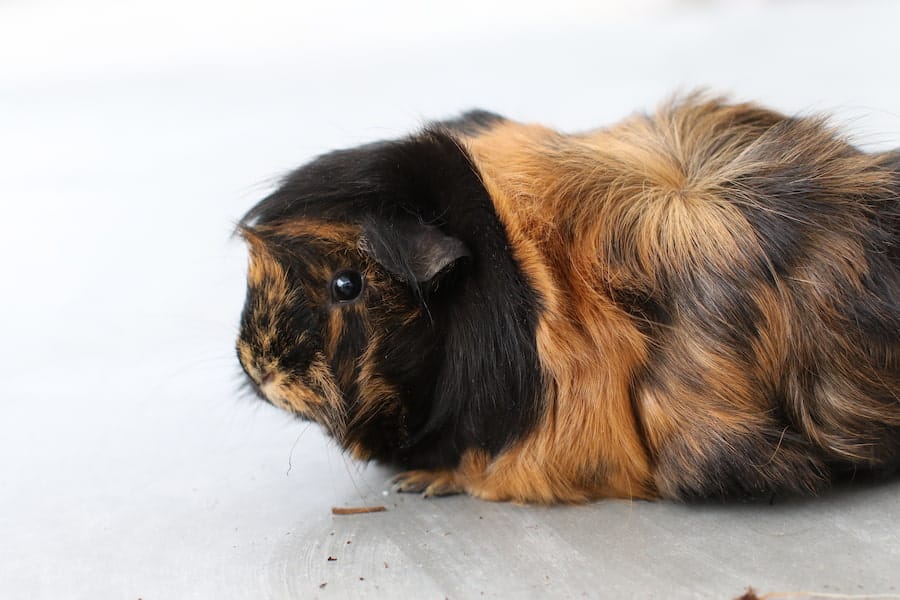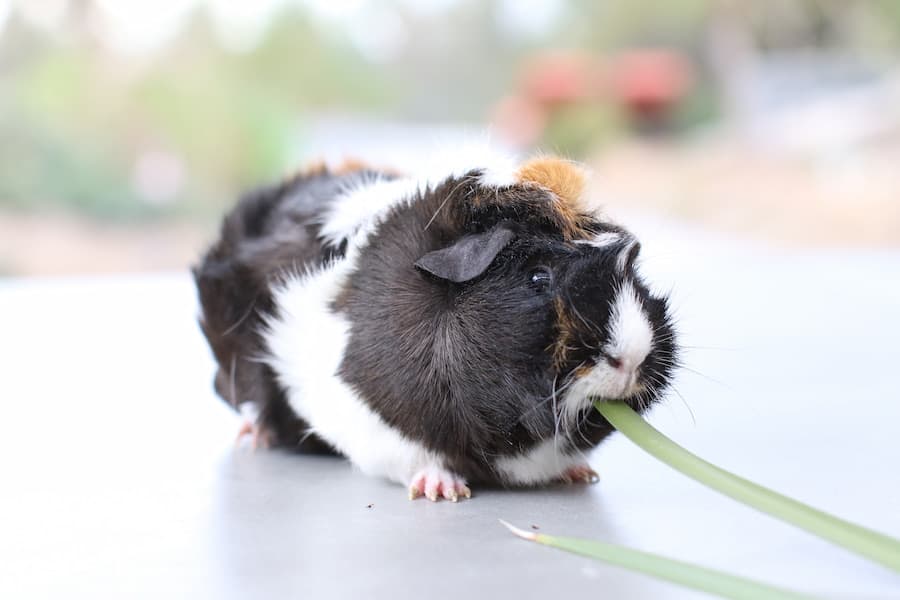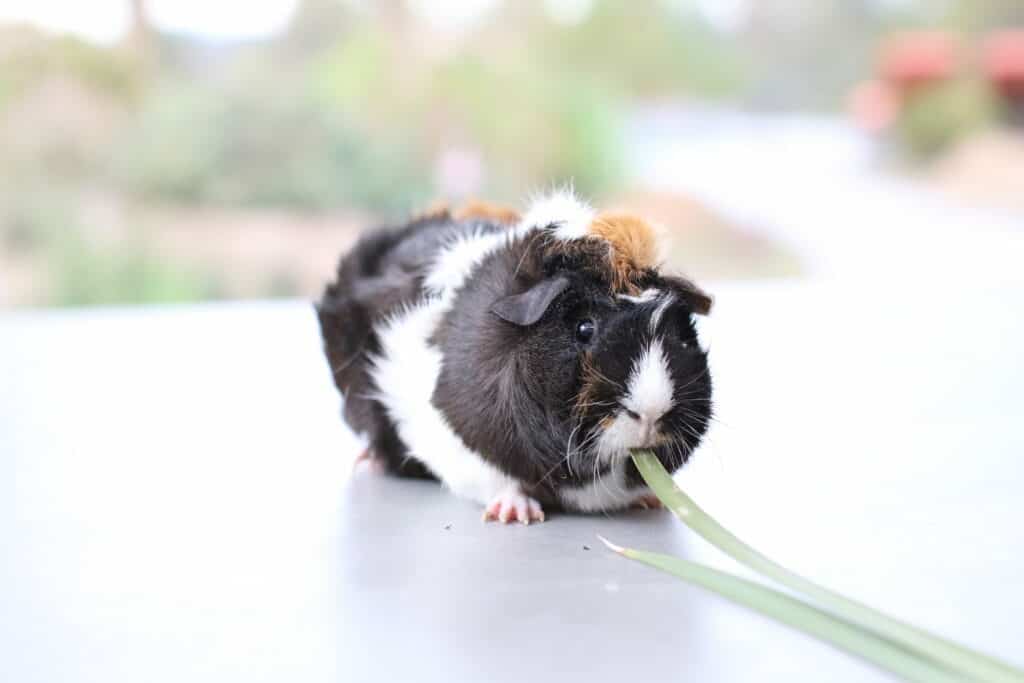As an Amazon Associate we earn from qualifying purchases.
Choosing the proper diet for your guinea can be challenging, especially if you are a new owner. Guinea pigs are herbivores that can eat most veggies and grasses. However, can guinea pigs eat scallions?
Can Guinea Pigs Eat Scallions?
Guinea pigs can eat the top leafy part of scallions. However, the bulb part of scallions is toxic and dangerous to your guinea pig. If you’re going to feed your guinea pig scallions, it is important to cut and dispose of the bulb part before.
Scallions are rich in nutrients that are good for your pet’s well-being. Served in the right portions, this vegetable can be an excellent snack for your guinea pig.

Benefits of Scallions to Guinea Pigs
A healthy and happy pet will generate the same energy for you and keep you smiling. Now that we’ve known your guinea pigs can feed on the leafy section of scallions, let’s find out what other benefits they provide your animal.
Energy Boost
Scallions provide your guinea pig with both proteins and carbohydrates. Carbs provide a quick burst of energy, while proteins give a constant stream of energy over time. Your guinea pig will have enough energy from feeding on scallions.
Nutritional Fats
Scallions have a modest amount of fat in them. These fats dissolve in their blood and:
- Improves their brain’s function
- Improves their brain performance
- Aid in the absorption of other nutrients
With zero cholesterol in these onions, your guinea pigs have a lower chance of developing clogged blood vessels. This reduces the risk of your guinea contracting cardiovascular disorders.
Vitamins
Vitamins are vital nutrients for your guinea pig. Enough amounts of vitamins boost the health of your pet. Scallions contain healthy nutrients, which include:
Vitamin C
These green onions contain a massive amount of vitamin C. Vitamin C protects guinea pigs from serious diseases such as scurvy resulting from a vitamin C deficiency.
Vitamin C deficiency causes your guinea to develop a rough coat. This may go ahead to include external bleeding wounds that may not heal properly.

Vitamin B
Scallions have two types of vitamin B which are:
- Vitamin B6: Vitamin B6 stimulates the production of serotonin hormone in your guinea pig. This hormone is responsible for reducing anxiety and depression in your pet.
- Folate vitamins: Folate is essential for the proper development of a fetus for a lower risk of birth abnormalities.
Other nutrients in scallions are Manganese and Selenium, which help in boosting the immune system. Zinc and iron help in DNA metabolism and blood cell production, respectively.
Health Risks of Scallions to Guinea Pigs
Scallions appear to be pretty beneficial to guinea pigs. They can, however, be deadly if they’re consumed in large quantities, just like any other food.
It would be best to avoid overfeeding your guinea pigs with scallions. Some potential dangers of overfeeding scallions to your guinea pigs include:
Bladder or Kidney Stones Formation
The calcium in scallions is essential for the growth and development of strong bones. However, if your guinea pigs ingest too much of it, it may build up and lead to bladder or kidney stones.
Kidney stones can have your guinea pig experiencing:
- Bloody urine
- Painful urination
- Renal failure
So, give your guinea pigs scallions in moderate proportions to have them receive just enough calcium.
Digestive Problems
Excessive bowel movements and loose motions are caused by too much fiber from scallions. A diet consisting of too much fiber may lead to an electrolyte imbalance in your guinea pig.
This imbalance may bring about stomach upset, vomiting, flatulence, and even diarrhea in severe cases.
Preparation of Scallions for Your Guinea Pig
First, you’ll have to wash the scallions to ensure the dirt is off. You’ll notice they have three sections; a green leafy top, a white part, and the bulb at the very end.
Cut the scallions right below the green leafy part, advisably having less of the white part. The white part is considered more ‘oniony’ and is used when cooking. The leafy part you’ve obtained is safe for guinea pigs to eat.
Alternative foods for scallions are:
- Beetroot
- Leafy greens
- Lettuce
- Dandelion greens
- Cucumber
- Chopped peppers
- Pumpkin
- Carrots
These foods would provide the same nutrients your guinea pig would get from scallions.

Related Questions
If you own a guinea pig, you’d want to know what other questions about scallions people frequently ask on the internet.
How Much Green Onion Can Guinea Pigs Eat?
Guinea pigs can eat p to a maximum of 6 grams of green onions. Guinea pigs can die from eating as little as over 2.5 grams per pound of their body weight. Most guinea pigs weigh between 1.5 and 2.5 pounds, so 6 grams is sufficient.
What Happens if a Guinea Pig Eats Onion?
One of the apparent signs your pig has consumed onions is they start vomiting. If left untreated, its health can deteriorate and cause serious health complications like anemia. Consult a vet as soon as possible if they’ve consumed onions.
Conclusion
Scallions are a good meal for your guinea pig. Definitely worth a try. Just ensure that when you’re feeding your guinea pig, give them in small amounts. Adequate quantities of nutritious food and snacks are all you need to keep a guinea pig happy and healthy.